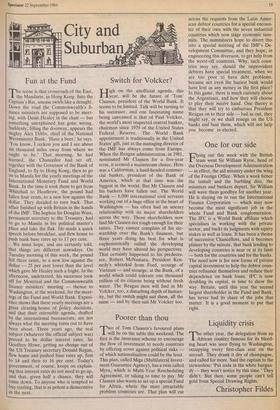City and
Fun at the Fund
The scene is that crossroads of the East, the Mandarin, in Hong Kong. Into the Captain's Bar, unease swirls like a draught. Down the road the Commonwealth's fi- nance ministers are supposed to be meet- ing, with Denis Healey in the chair — but something unexplained has gone wrong. Suddenly; filling the doorway, appears the mighty Alex Dibbs, chief of the National Westminster Bank. 'Have a beer,' he says. 'You know, I reckon you and I are about six thousand miles away from where we ought to be.' That morning, he had learned, the Chancellor had set off, together with the Governor of the Bank of England, to fly to Hong Kong; then to go on to Manila for the yearly meetings of the International Monetary Fund and World Bank. In the time it took them to get from Whitehall to Heathrow, the pound had fallen four cents, to a new low against the dollar. They decided to turn back. That affair finished up with Britain in the hands of the IMF. The hapless Sir Douglas Wass, Permanent secretary to the Treasury, had to go to Manila in his political master's Place and take the flak. He made a quick speech before breakfast, and flew home to Push bank base rates up to 17 per cent. We must hope, and are certainly told, that things are different nowadays. On Tuesday morning of this week, the pound fell three cents, to a new low against the dollar — 25 per cent lower than the level which gave Mr Healey such a fright. In the afternoon, undeterred, his successor took off for Montreal and the Commonwealth finance ministers' meeting — thence to Washington, at the weekend, for the meet- ings of the Fund and World Bank. Experi- ence shows that these yearly meetings are a great clearing-house of Policy decisions, and that their ostensible agenda, drafted by the international bureaucrats, are not always what the meeting turns out to have been about. Three years ago, the real subject (whatever the official subject was) proved to be dollar interest rates. Sir Geoffrey Howe, getting no change out of the US Treasury secretary Donald Regan, flew home and pushed base rates up, first to 14 and then to 16 per cent. Today's government, of course, keeps on explain- mg that interest rates do not need to go up, and that, given half a chance, they will Come down. To anyone who is tempted to buy sterling, that is as potent a disincentive as the next.










































 Previous page
Previous page